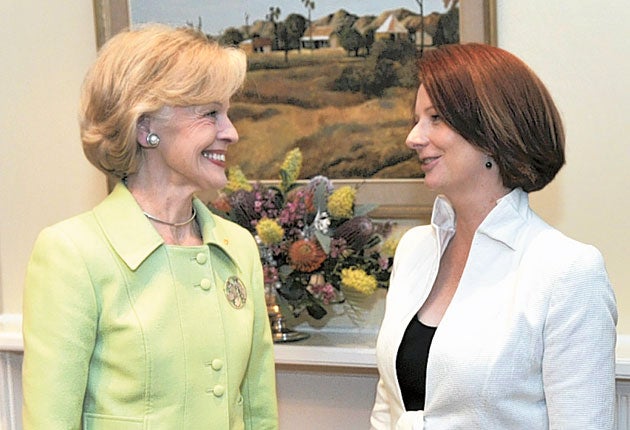Julia Gillard sneaks in to form minority government

Your support helps us to tell the story
From reproductive rights to climate change to Big Tech, The Independent is on the ground when the story is developing. Whether it's investigating the financials of Elon Musk's pro-Trump PAC or producing our latest documentary, 'The A Word', which shines a light on the American women fighting for reproductive rights, we know how important it is to parse out the facts from the messaging.
At such a critical moment in US history, we need reporters on the ground. Your donation allows us to keep sending journalists to speak to both sides of the story.
The Independent is trusted by Americans across the entire political spectrum. And unlike many other quality news outlets, we choose not to lock Americans out of our reporting and analysis with paywalls. We believe quality journalism should be available to everyone, paid for by those who can afford it.
Your support makes all the difference.Australia finally got a new government yesterday after 17 days of political deadlock, with Labor's Julia Gillard emerging victorious by the slimmest of margins – prompting doubts about how long her minority administration will last.
Last month's federal election produced a hung parliament, with neither Labor nor Tony Abbott's conservative coalition able to muster a majority in the 150-member lower house. That made kingmakers of one Green and four independent MPs, who suddenly became the most popular men in the country.
After successfully wooing four of the five, Welsh-born Ms Gillard now controls 76 seats, and can finally call herself Australia's first elected female prime minister. However, her position will be shaky if one of her MPs retires, or dies, or falls ill, or gets embroiled in a scandal warranting their resignation.
The independents, moreover, have committed themselves only to supporting her on finance bills and no-confidence motions. That means she will be obliged to play a numbers game every time she wants to pass legislation.
Her anointment follows a period of unprecedented political drama in Australia, which began when Ms Gillard deposed her predecessor, Kevin Rudd, and called an election. While the Greens MP, Adam Bandt, allied himself with Labor soon after the inconclusive result, the independents kept the country guessing.
Last week the pendulum seemed to be swinging in Mr Abbott's favour. Then one independent, Andrew Wilkie, declared himself for Labor, after double-bluffing Mr Abbott with a demand for money for a new hospital in his native Tasmania – then rejecting the sum as unethical. Ms Gillard still needed two of the remaining trio, who were set to announce their decision yesterday. All were expected to jump the same way; however, Bob Katter, a maverick Queenslander, suddenly called his own press conference and backed the coalition.
That made it 74 seats all. An hour later, Tony Windsor and Rob Oakeshott threw their weight behind Labor. At last the waiting game was over – not just for the nation, but for Ms Gillard and Mr Abbott, who had to watch the televised press conference to find out what the pair had decided. The latter, who came tantalisingly close to his goal, said: "It's a disappointing day, a disappointing result." Ms Gillard said that Labor was "prepared to deliver stable, effective and secure government for the next three years".
However, John Wanna, a professor of politics at the Australian National University, warned that Labor would have to swap its "majoritarian" culture for a more consultative way of working. "The independents are not in coalition with the government; they're reserving the right to vote any way they like on particular issues," he said.
"If two of them decided to support Abbott instead, we could have a change of government without an election. Gilard would have to resign and Abbott would become prime minister."
That was precisely what happened after Australia's last hung parliament in 1940. The coalition's Robert Menzies formed a minority government with the support of two independents; a year later, they switched their support to Labor, whose leader John Curtin, became prime minister.
Ms Gillard will press ahead with a $43bn (£26bn) national broadband network and a new tax on the mining industry. However, some of her other plans are in doubt. The Greens oppose the processing of asylum-seekers offshore, and they are likely to demand a conscience vote on same-sex marriage.
Join our commenting forum
Join thought-provoking conversations, follow other Independent readers and see their replies
Comments